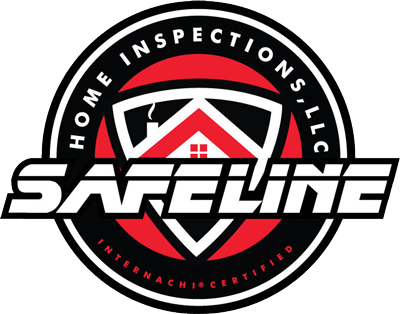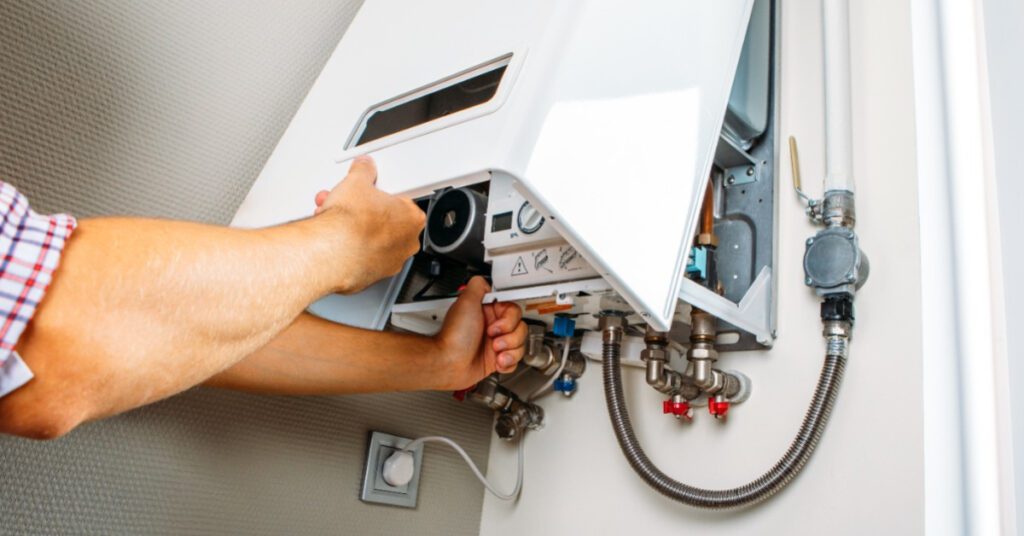Different Types of Water Heaters: Exploring Gas, Electric, Tankless, Traditional, and Hybrid
Water heaters are essential appliances in our homes, providing hot water for various purposes, including bathing, washing dishes, and laundry. And when it comes to choosing a water heater, there are several options available, each with its own set of benefits and considerations.
In this article, we will explore the different types of water heaters, including gas, electric, tankless, traditional, and hybrid models. We’ll delve into how each type works, discuss their pros and cons, and provide tips for maintaining them effectively.
Gas Water Heaters
Gas water heaters are a popular choice among homeowners due to their efficiency and reliability. These heaters utilize natural gas or propane to heat the water. The combustion process occurs in a burner assembly, which heats the water stored in a tank. Here’s a closer look at gas water heaters:
How Gas Water Heaters Work
Gas water heaters feature a burner assembly at the bottom of the tank. And it utilizes natural gas or propane as its fuel source. The process begins when cold water enters the tank through a dip tube. Inside the tank, there is a burner assembly located at the bottom. When you turn on the hot water tap, the burner ignites, creating a flame that heats the water.
The burner assembly is equipped with a pilot light, which is a small, continuously burning flame. When the hot water tap is turned on, the pilot light ignites the gas, and the main burner fires up, generating a larger flame. This flame heats the water in the tank, raising its temperature to the desired level.
As the water heats up, it rises to the top of the tank. When you open a hot water tap in your home, the heated water is drawn from the top of the tank and flows through the plumbing system, delivering hot water wherever it is needed.
Gas water heaters have a thermostat that allows you to set the desired temperature for the hot water. Once the water reaches the set temperature, the burner will modulate or turn off to maintain that temperature, ensuring a steady supply of hot water whenever required.
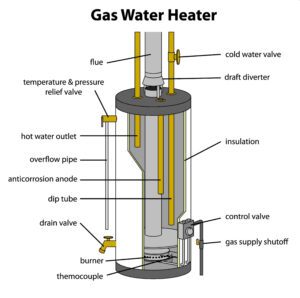
Benefits of Gas Water Heaters
- Efficiency: Gas water heaters are highly efficient and can quickly heat large volumes of water.
- Lower Operating Costs: Natural gas prices are often lower than electricity rates, resulting in cost savings for homeowners.
- Reliable Performance: Gas water heaters provide a continuous supply of hot water, making them suitable for larger households with higher hot water demands.
Cons of Gas Water Heaters
- Higher Initial Cost: Gas water heaters generally have a higher upfront cost compared to electric models.
- Requires Ventilation: Gas water heaters produce combustion byproducts that need proper ventilation to ensure safety.
- Limited Placement Options: Gas water heaters require adequate space and ventilation, which can restrict their placement within a home.
Tips for Maintaining Gas Water Heaters
- Regularly inspect and clean the burner assembly to ensure efficient combustion.
- Check the pilot light regularly to ensure it’s lit and functioning correctly.
- Flush the tank annually to remove the sediment buildup, which can affect performance.
- Inspect the flue and venting system for any obstructions or damage.
Electric Water Heaters
Electric water heaters are another common option, relying on electricity to heat the water. They are relatively simple in design and offer some unique benefits. Let’s explore electric water heaters:
How Electric Water Heaters Work
Electric water heaters rely on electrical energy to heat the water. Inside the unit, there are one or more heating elements immersed in the water tank. When the hot water tap is turned on, a thermostat in the heater senses the drop in temperature and signals the heating elements to activate.
Once activated, the heating elements convert electrical energy into heat. They generate intense heat, which is transferred directly to the water surrounding them. As the water heats up, it rises to the top of the tank, ready to be used.
Electric water heaters also feature a thermostat that allows homeowners to set the desired temperature of the hot water. The thermostat monitors the water temperature and signals the heating elements to turn off once the set temperature is reached. When the temperature drops below the set level, the heating elements are activated again to reheat the water.
The heated water is then delivered to the faucets and appliances in the house through the plumbing system, providing a continuous supply of hot water for bathing, washing dishes, and other needs.
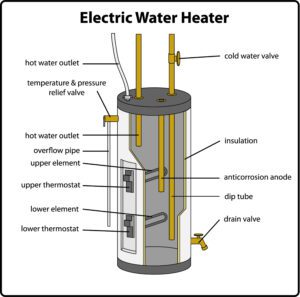
Benefits of Electric Water Heaters
- Lower Initial Cost: Electric water heaters generally have a lower upfront cost compared to gas models.
- Ease of Installation: Electric water heaters are relatively easier to install since they don’t require venting.
- Safe Operation: Electric water heaters do not produce combustion byproducts, making them safer for indoor use.
Cons of Electric Water Heaters
- Higher Operating Costs: Electricity rates are often higher than natural gas prices, resulting in higher operating costs.
- Slower Recovery Time: Electric water heaters may take longer to reheat the water, leading to potential temporary supply limitations.
- Limited Efficiency: Electric water heaters may have lower efficiency ratings compared to some gas models.
Tips for Maintaining Electric Water Heaters
- Inspect the heating elements periodically for any signs of corrosion or damage.
- Test the pressure relief valve to ensure it’s functioning correctly.
- Insulate the hot water pipes to reduce heat loss during distribution.
- Consider draining and flushing the tank periodically to remove sediment buildup.
Tankless Water Heaters
Tankless water heaters, also known as on-demand water heaters, have gained popularity in recent years due to their energy efficiency and space-saving design. Instead of storing hot water in a tank, tankless heaters heat water as it passes through the unit. Let’s dive into tankless water heaters:
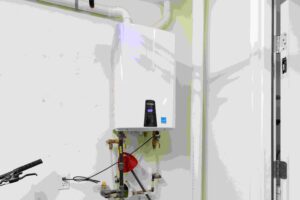
How Tankless Water Heaters Work
Tankless water heaters operate by heating water directly as it passes through the unit. When a hot water tap is turned on, cold water enters the tankless heater through an inlet pipe. Inside the unit, powerful heating elements or a heat exchanger rapidly heat the water to the desired temperature.
The heating process in tankless water heaters is triggered by the flow of water. As soon as the water starts flowing through the unit, the heating elements or heat exchanger activate, quickly raising the temperature of the water. This ensures an immediate supply of hot water without the need for preheating or storing water in a tank.
The heating elements or heat exchangers continue to operate as long as hot water is being used. When the hot water tap is turned off, the tankless heater stops heating the water, conserving energy.
Benefits of Tankless Water Heaters
- Energy Efficiency: Tankless water heaters only heat water when needed, resulting in lower energy consumption.
- Endless Hot Water: Tankless models provide a continuous supply of hot water, eliminating the need to wait for the tank to refill.
- Space-Saving Design: Tankless water heaters are compact and can be wall-mounted, saving valuable floor space.
Cons of Tankless Water Heaters
- Higher Initial Cost: Tankless water heaters tend to have a higher upfront cost compared to traditional tank models.
- Limited Flow Rate: The flow rate of tankless water heaters is finite and may not support multiple simultaneous hot water uses.
- Potential Retrofitting: Installing a tankless water heater may require adjustments to the home’s electrical or gas infrastructure.
Tips for Maintaining Tankless Water Heaters
- Follow the manufacturer’s guidelines for descaling the unit to remove mineral deposits.
- Inspect the venting system regularly to ensure proper exhaust flow.
- Flush the unit annually to remove any buildup or sediment.
- Check the water inlet filter and clean or replace it as recommended.
Traditional Water Heaters
Traditional water heaters, also known as storage tank water heaters, have been widely used for decades. These heaters store hot water in a tank, ready for use whenever needed. Let’s explore traditional water heaters:
How Traditional Water Heaters Work
Traditional water heaters consist of a storage tank that holds and heats the water. Inside the tank, there are heating elements or a burner assembly. When the hot water tap is turned on, the thermostat in the water heater detects the drop in temperature and signals the heating elements or burner to activate.
Once activated, the heating elements or burner generate heat, which is transferred to the water in the tank. As the water heats up, it rises to the top of the tank, ready for use.
Traditional water heaters are equipped with a thermostat that allows homeowners to set the desired temperature for the hot water. The thermostat continuously monitors the water temperature and signals the heating elements or burner to turn off once the set temperature is reached. When the water temperature drops below the set level, the heating elements or burner are activated again to reheat the water.
Benefits of Traditional Water Heaters
- Lower Initial Cost: Traditional water heaters tend to have a lower upfront cost compared to tankless models.
- Easy Replacement: If you’re replacing an existing traditional water heater, the installation process is often straightforward.
- Familiar Technology: Traditional water heaters have been widely used and understood, making them a familiar choice for many homeowners.
Cons of Traditional Water Heaters
- Higher Energy Consumption: Traditional water heaters continuously heat and reheat water, resulting in higher energy consumption.
- Limited Hot Water Supply: The amount of hot water available is determined by the tank’s capacity, which may run out during periods of high demand.
- Risk of Standby Heat Loss: Traditional water heaters can experience standby heat loss, where heat escapes through the tank walls, leading to energy wastage.
Tips for Maintaining Traditional Water Heaters
- Regularly check the anode rod and replace it if it’s severely corroded.
- Drain the tank annually to remove sediment buildup.
- Insulate the tank and hot water pipes to minimize standby heat loss.
- Monitor the temperature and pressure relief valve to ensure proper operation.
Hybrid Water Heaters
Hybrid water heaters combine the technology of traditional storage tank heaters with heat pump technology to maximize energy efficiency. These heaters extract heat from the surrounding air and use it to warm the water. Let’s explore hybrid water heaters:
How Hybrid Water Heaters Work
Hybrid water heaters utilize a heat pump in addition to a storage tank. The heat pump extracts heat from the surrounding air and transfers it to the water stored in the tank. When the hot water tap is turned on, the heat pump initiates the heating process.
The heat pump consists of an evaporator coil, a compressor, and a condenser coil. The evaporator coil absorbs heat from the ambient air, and the compressor increases the temperature and pressure of the refrigerant. The hot refrigerant then passes through the condenser coil, where it transfers its heat to the water in the storage tank.
If the ambient air temperature is too low for efficient heat extraction, hybrid water heaters can also utilize electric heating elements as a backup to ensure a continuous supply of hot water.
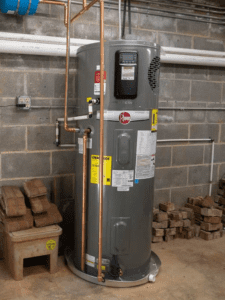
Benefits of Hybrid Water Heaters
- High Energy Efficiency: Hybrid water heaters are extremely energy-efficient, as they utilize heat from the surrounding air.
- Cost Savings: The energy savings from using a hybrid water heater can result in lower utility bills over time.
- Environmental Friendliness: Hybrid heaters produce fewer greenhouse gas emissions compared to traditional models.
Cons of Hybrid Water Heaters
- Higher Initial Cost: Hybrid water heaters generally have a higher upfront cost compared to traditional models.
- Space Requirements: Hybrid water heaters require sufficient space for the heat pump unit and the storage tank.
- Potential Noise: The heat pump in hybrid water heaters may produce some noise during operation.
Tips for Maintaining Hybrid Water Heaters
- Clean the air filter regularly to ensure proper airflow to the heat pump unit.
- Check and clean the condensate drain to prevent clogging.
- Insulate the tank and hot water pipes to minimize standby heat loss.
- Follow the manufacturer’s guidelines for maintenance and troubleshooting.
Which Is the Right Option?
With a variety of water heater options available, choosing the right one for your home can seem difficult. Each type of water heater has its unique features, benefits, and considerations. To determine the ideal option for your needs, it’s essential to evaluate factors such as energy efficiency, installation requirements, hot water demand, and budget. Let’s explore these factors to consider when deciding on the right water heater for you.
Energy Efficiency: If energy efficiency is a top priority for you, tankless and hybrid water heaters are excellent options. Tankless models only heat water on demand, eliminating standby heat loss and resulting in significant energy savings. Hybrid water heaters combine heat pump technology with traditional storage tanks, maximizing efficiency by utilizing ambient air heat. However, it’s important to note that the initial cost of these models might be higher compared to gas or electric water heaters.
Installation Requirements: Different water heaters have varied installation requirements. For instance, gas water heaters require proper ventilation for safe operation, which may impact the placement options within your home. Electric water heaters are relatively easier to install since they do not require venting. Tankless models are compact and can be wall-mounted, saving valuable floor space. Traditional water heaters are familiar and straightforward to replace if you’re upgrading from an existing unit.
Hot Water Demand: Consider your household’s hot water demand when choosing a water heater. Gas water heaters are known for their high hot water output, making them suitable for larger households with multiple simultaneous hot water needs. Tankless models provide a continuous supply of hot water, eliminating the concern of running out. Traditional water heaters have a predetermined storage tank capacity, which may be suitable for smaller households with moderately hot water demands.
Budget: Your budget is a significant consideration when selecting a water heater. Gas water heaters generally have a higher upfront cost, but their lower operating costs can result in long-term savings. Electric water heaters tend to be more budget-friendly initially, but they may have higher operating costs. Tankless and hybrid models usually have higher upfront costs but offer energy savings in the long run. Traditional water heaters are typically the most affordable option upfront.
Maintenance: Proper maintenance is crucial for the efficient and long-lasting operation of your water heater. Gas water heaters require periodic inspections, cleaning of the burner assembly, and ventilation checks. Electric water heaters need regular checks of heating elements and pressure relief valves. Tankless models may require descaling and cleaning of filters. Traditional water heaters benefit from draining and flushing to remove sediment buildup. Consider the maintenance requirements of each type and choose one that aligns with your willingness to perform regular upkeep.
If you would like for us to perform a full home inspection Tampa Florida at your home, Schedule your Inspection with us today.
Conclusion
In the end, the right water heater option depends on your specific needs and preferences. All it requires is to select and properly maintain the right water heater to enjoy reliable hot water for you and your family’s daily activities, and comfort. However, you can consult with a professional plumber to provide valuable insights and help you make an informed decision.
References
[1] Gallant, T. (2020). Water Heater Buying Guide. This Old House. Retrieved from https://www.thisoldhouse.com/
[2] U.S. Department of Energy. (n.d.). Water Heating. Energy Saver. Retrieved from https://www.energy.gov/energysaver/water-heating
[3] HomeAdvisor. (2021). Water Heater Installation & Replacement Costs. HomeAdvisor. Retrieved from https://www.homeadvisor.com/cost/plumbing/install-a-water-heater/
[4] Consumer Reports. (2022). Water Heater Ratings & Buying Guide. Consumer Reports. Retrieved from https://www.consumerreports.org/cro/water-heaters/buying-guide/index.htm
[5] PlumbingSupply.com. (n.d.). Tankless Water Heater Buying Guide. PlumbingSupply.com. Retrieved from https://www.plumbingsupply.com/
